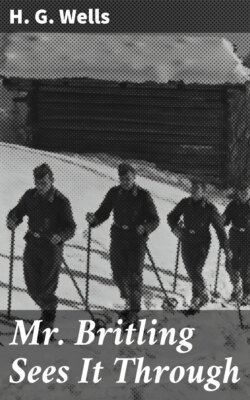Читать книгу Mr. Britling Sees It Through - H. G. Wells - Страница 22
На сайте Литреса книга снята с продажи.
§ 2
ОглавлениеHe left it at that for the time, but throughout the afternoon Mr. Direck had the gratification of seeing his thought floating round and round in the back-waters of Mr. Britling's mental current. If it didn't itself get into the stream again its reflection at any rate appeared and reappeared. He was taken about with great assiduity throughout the afternoon, and he got no more than occasional glimpses of the rest of the Dower House circle until six o'clock in the evening.
Meanwhile the fountains of Mr. Britling's active and encyclopædic mind played steadily.
He was inordinately proud of England, and he abused her incessantly. He wanted to state England to Mr. Direck as the amiable summation of a grotesque assembly of faults. That was the view into which the comforts and prosperities of his middle age had brought him from a radicalism that had in its earlier stages been angry and bitter. And for Mr. Britling England was "here." Essex was the county he knew. He took Mr. Direck out from his walled garden by a little door into a trim paddock with two white goals. "We play hockey here on Sundays," he said in a way that gave Mr. Direck no hint of the practically compulsory participation of every visitor to Matching's Easy in this violent and dangerous exercise, and thence they passed by a rich deep lane and into a high road that ran along the edge of the deer park of Claverings. "We will call in on Claverings later," said Mr. Britling. "Lady Homartyn has some people there for the week-end, and you ought to see the sort of thing it is and the sort of people they are. She wanted us to lunch there to-morrow, but I didn't accept that because of our afternoon hockey."
Mr. Direck received this reason uncritically.
The village reminded Mr. Direck of Abbey's pictures. There was an inn with a sign standing out in the road, a painted sign of the Clavering Arms; it had a water trough (such as Mr. Weller senior ducked the dissenter in) and a green painted table outside its inviting door. There were also a general shop and a number of very pleasant cottages, each marked with the Mainstay crest. All this was grouped about a green with real geese drilling thereon. Mr. Britling conducted his visitor (through a lych gate) into the church-yard, and there they found mossy, tumble-down tombstones, one with a skull and cross-bones upon it, that went back to the later seventeenth century. In the aisle of the church were three huge hatchments, and there was a side chapel devoted to the Mainstay family and the Barons Homartyn, with a series of monuments that began with painted Tudor effigies and came down to a vast stained glass window of the vilest commercial Victorian. There were also mediæval brasses of parish priests, and a marble crusader and his lady of some extinguished family which had ruled Matching's Easy before the Mainstays came. And as the two gentlemen emerged from the church they ran against the perfect vicar, Mr. Dimple, ample and genial, with an embracing laugh and an enveloping voice. "Come to see the old country," he said to Mr. Direck. "So Good of you Americans to do that! So Good of you. … "
There was some amiable sparring between the worthy man and Mr. Britling about bringing Mr. Direck to church on Sunday morning. "He's terribly Lax," said Mr. Dimple to Mr. Direck, smiling radiantly. "Terribly Lax. But then nowadays Everybody is so Lax. And he's very Good to my Coal Club; I don't know what we should do without him. So I just admonish him. And if he doesn't go to church, well, anyhow he doesn't go anywhere else. He may be a poor churchman, but anyhow he's not a dissenter. … "
"In England, you see," Mr. Britling remarked, after they had parted from the reverend gentleman, "we have domesticated everything. We have even domesticated God."
For awhile Mr. Britling showed Mr. Direck English lanes, and then came back along narrow white paths across small fields of rising wheat, to the village and a little gate that led into the park.
"Well," said Mr. Direck, "what you say about domestication does seem to me to be very true indeed. Why! even those clouds up there look as though they had a shepherd and were grazing."
"Ready for shearing almost," said Mr. Britling.
"Indeed," said Mr. Direck, raising his voice a little, "I've seen scarcely anything in England that wasn't domesticated, unless it was some of your back streets in London."
Mr. Britling seemed to reflect for a moment. "They're an excrescence," he said. …
